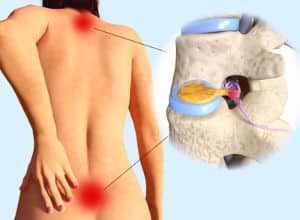You might have had a pinched nerve and need immediate pinched nerve treatment if you have ever had pain and weren’t quite sure what caused it. Although it’s most common in the neck or back, a pinched nerve could also occur in other body parts, such as the wrist. Recognizing pinched nerve symptoms and signs is vital for receiving the proper pinched nerve treatment.
What is a Pinched Nerve?
A pinched nerve is a compressed nerve. Surrounding tissues pressing on nerve roots could cause pain, numbness, and tingling in different areas of your body. In many instances, the cause is a herniated disk slipping out between vertebrae in your spinal cord and pressing on your spinal nerve that goes down the leg.
Most pinched nerves are from the neck (cervical radiculopathy), lower back (lumbar radiculopathy), upper-middle back (thoracic radiculopathy), or upper-middle back (thoracic radiculopathy. You can also experience pinched nerves in the hand, elbow, and wrist (carpal tunnel syndrome for your wrist).
Pinched nerves could affect several areas of your body:

A pinched nerve in the cervical spine could give you a stiff neck, and the pain and numbness could affect the shoulder and arm.
A pinched lumbar nerve in your lower back can cause pain in your back, hips, buttocks, and legs.
Thoracic radiculopathy causes pain in the chest area. If you have severe chest pain, play it safe and contact your healthcare provider.
A pinched nerve could be painful, but it’s usually treatable with rest, over-the-counter medication, and physical therapy. Most individuals recover fully from a pinched nerve through simple pinched nerve treatment.
What Causes a Pinched Nerve?
The American Association of Neuromuscular and Electrodiagnostic Medicine states that a pinched nerve happens when the nerve’s surrounding tissue puts pressure on it. The pressure could change how the nerve functions and result in pain or a tingling sensation.
This tingling or pain can be temporary or long-lasting and minor or severe.
A pinched nerve could be caused by a herniated disc, which is when one of the discs between your spinal bones (vertebrae) pushes out. The abnormal narrowing of your body channel occupied by the spinal cord, which is Spinal stenosis, could also cause a pinched nerve.
Pinched Nerve Causes and Symptoms
A pinched nerve could happen to anyone, but certain people have a higher risk than others. Someone whose job has repetitive motions may be more likely to experience a pinched nerve. Or a pinched nerve might occur after a long period of sitting or sleeping in an awkward position. Pregnant women could also experience pinched nerves because of the extra weight.

If you have a pinched nerve, symptoms may include:
- Pins and needles or tingling sensation
- A sharp aching or burning pain that might radiate outward
- Numbness or reduced feeling in the affected area
How is a Pinched Nerve Diagnosed?
Please visit a healthcare provider about your pinched nerve if it is not responding to conservative pinched nerve treatment at home. To locate the source of the pinched nerve, providers physically examine your neck, arms, shoulders, wrist, and hands. They’ll look for muscle weakness, test changes in reflexes, and ask about the different sensations you’re feeling.
If necessary, you might be asked to undergo one or more of these procedures to track the source of the issue:
X-ray: An X-ray could show narrowing and changing spinal cord alignment and fractures.
Computed tomography (CT) scan: A CT reveals 3D images and more spine detail than an X-ray.

Magnetic resonance imaging (MRI): An MRI could show if damage to soft tissues is causing the nerve compression or if there’s damage to the spinal cord.
Electromyography (EMG): Electrical muscle impulses measured by an EMG and nerve conduction studies could help determine if a nerve is working normally. This helps your provider see if symptoms are caused by pressure on spinal nerve roots or if another condition like diabetes causes nerve damage.
What are Some Common Pinched Nerve Treatments?
Time and Rest
For several people, time takes care of this issue and doesn’t need serious pinched nerve treatment. Your pain should subside in a few days or weeks.
Ice and Heat
Apply heat and ice as you would with any swollen part for temporary relief.
Over-the-counter Pain Relievers
Non-steroidal anti-inflammatory drugs (NSAIDs)and Acetaminophen may help your symptoms. NSAIDs include naproxen and ibuprofen.

Splints and Cervical Collars
Your provider might advise you to wear a neck collar or soft hand splint for a brief time to limit motion as you heal.
Corticosteroids
Your provider might prescribe strong anti-inflammatory medications such as prednisone for pinched nerve treatment. These could be taken orally (through the mouth) or injected directly into the affected region.
Physical Therapy
Light exercise and stretches can help ease pressure on your nerves and relieve minor pain. Talk to your physical therapist or provider about what exercises are best for the type of pinched nerve you are experiencing.
Chiropractic Care for Pinched Nerve Treatment
The longer the entrapped nerve is left untreated, the higher the risk becomes for experiencing permanent damage. With early pinched nerve treatment, many of the issues cannot only relieve the pain but correct the underlying root problem and return to the normal function of the affected nerve.
Stretches For a Pinched Nerve
Many chiropractors advise utilizing more natural pinched nerve treatment methods, and one of the best home remedies for a pinched nerve is finishing a series of exercises and stretches depending on the location of the nerve.
Try the sitting, reclining, and forward pigeon pose for lower back pain. These all help target your hips and stretch out the compressed vertebrae in your spine. Creating more space in the spine will help relieve the built-up pressure.
Neck Pain: Do the “Chin Tuck While Looking Down” exercise to help open up the neck joint spaces.

Even though there are many more stretches that you could practice, try and hone down the underlying problem that’s causing the nerve pain by asking these questions:
- Do you work sitting down all day?
- Do you have good posture?
- Are you getting enough sleep?
- Were you in a car accident?
This nerve pain problem could be quickly cured once the cause is identified and treated by a trusted chiropractor. They could help work through the questions listed above to identify the root source of the problem and work with you to create a long-term pinched nerve treatment plan.
If you’re experiencing pain that a pinched nerve could cause, we would love to help. Please reach out to our team of experts to get started on your pinched nerve treatment!
FAQ
What relieves pinched nerve pain?
Nonsteroidal anti-inflammatory medications, like naproxen sodium or ibuprofen, physical therapy, and chiropractic care can help relieve pain.
How long pinched nerve pain last?
On average, a pinched nerve can last from a few days to as long as 4 to 6 weeks — or, in some instances, even longer (in which case you need to see your doctor).
